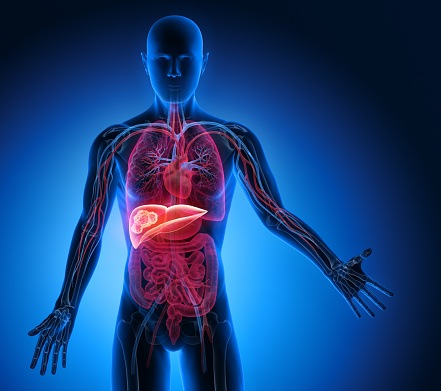
Men with the genetic disorder hemochromatosis are ten times more likely to develop liver cancer, according to a new study published in JAMA.
Hemochromatosis is a hereditary disorder marked by buildup of iron, or iron overload, in the body. If left untreated, it can lead to damage in parts of the body such as the liver, joints, and heart. Hemochromatosis is predominantly caused by the HFE p.C282Y homozygous pathogenic variant.
In this study, researchers followed up on 451,186 participants (mean age 56.8 years; 54.3% women), selected from the large biomedical database UK Biobank, for a median of 8.9 years. Among male participants, 1,294 men had the homozygous pathogenic variant linked to hemochromatosis. The two primary outcomes were incident of primary liver carcinoma and death from any cause. Investigators assessed associations between genotype and outcomes using an adjusted Cox regression and estimated Kaplan-Meier lifetable probabilities of incident diagnoses from age 40 to 75 by genotype and sex.
Men with homozygous p.C282y had a higher risk of hepatic malignancies (hazard ratio [HR], 10.5, 95% confidence interval [CI], 6.6-16.7; P<.001) and all-cause mortality (HR 1.2, 95% CI, 1.0-1.5; P=.046) compared with men who did not have those genomic variants. Based on lifetable projections, risk of primary hepatic malignancy was 7.2% (95% CI, 3.9%-13.1%) for homozygous men compared with 0.6% (95% CI, 0.4%-0.7%) for men in the control group. Risk of death was also higher among homozygous men (19.5% vs 15.1%, respectively.) The investigators found no statistically significant associations for women.
“Tragically, men with the hemochromatosis faulty genes have been dying of liver cancer for many years, but this was thought to be rare. The large scale of UK Biobank study allowed us to measure cancer risk accurately,” said research team leader David Melzer, PhD, in a press release. “We were shocked to find that more than 7% of men with two faulty genes are likely to develop liver cancer by age 75, particularly considering that the UK has the second highest rate of these faulty genes in the world. Fortunately, most of these cancers could be prevented with early treatment.”
What is the real-life risk for #HCC in subjects with #Hemochromatosis HFE p.C282Y?
MEN:
HR 10.5 (95%CI 6.6-16.7)
Lifetime probability: 7.2%WOMEN:
HR 2.2 (95%CI, 0.7-6.5) non-significanthttps://t.co/XkSPdIEPX4 via @JAMA_current part of @JAMANetwork pic.twitter.com/uhXiwajofz— Alexander Link (@alinkmd) November 25, 2020
Among the 500k UKBB participants, 2890 (0.6%) were homozygous for missense mutation in HFE gene and among them only 210 (7.2%) were formally diagnosed with hemochromatosis. https://t.co/jWHhyKA500
— Veera M. Rajagopal (@doctorveera) November 25, 2020






 © 2025 Mashup Media, LLC, a Formedics Property. All Rights Reserved.
© 2025 Mashup Media, LLC, a Formedics Property. All Rights Reserved.